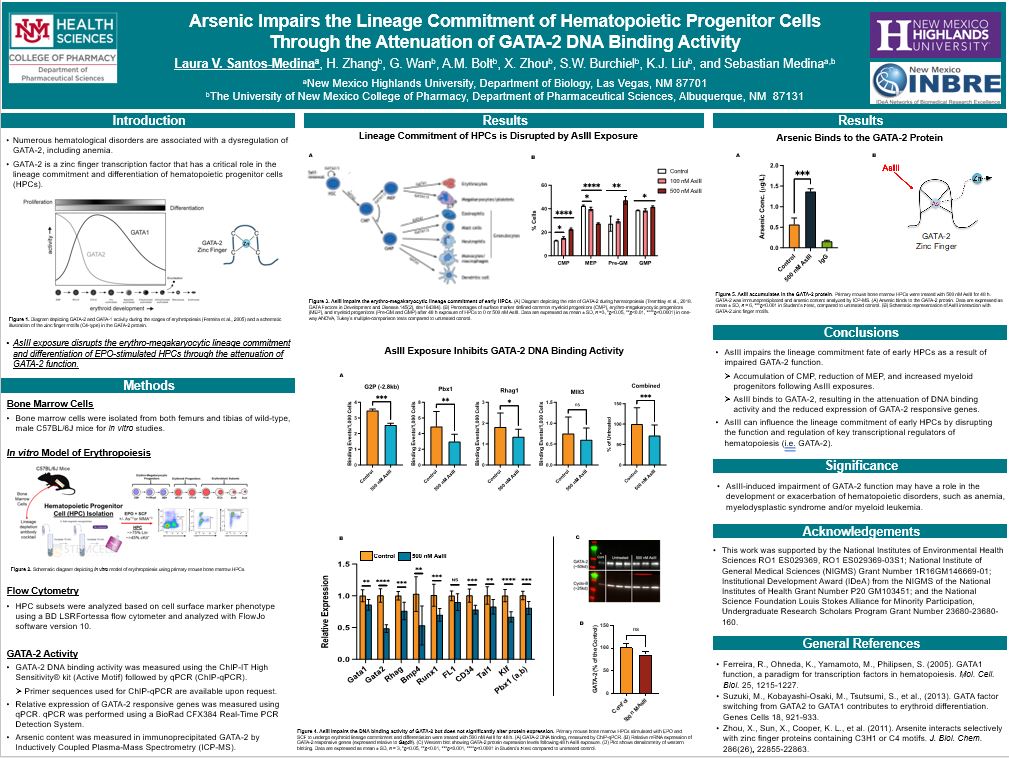Non-traditional NMHU biology student’s research takes home top prize
LAS VEGAS, NM – New Mexico Highlands University biology major Laura Santos-Medina’s research poster won first place at the New Mexico Alliance for Minority Participation (NMAMP) conference on Friday, October 7, in Las Cruces, NM. The poster, which explains the influence of arsenic on various blood disorders, was one of 47 submissions from students in two- and four-year programs.
Santos-Medina’s research lays the groundwork for developing novel strategies for the treatment of environmental contaminant-induced blood disorders such as anemia. Noting a current study in Bangladesh, where high numbers of anemia are attributable to elevated arsenic levels in local drinking water, Santos-Medina points out that similar situations exist here in New Mexico. Many rural communities in the state are built on former mining sites, relying on wells or old pipes carrying arsenic and/or other metal-contaminated water to their homes.
“This project became personal because many people worldwide are affected by anemia, and there appears to be a correlation between arsenic exposure and anemia, although the mechanistic basis is not yet fully known,” Santos-Medina said. “Many people in our state are exposed to arsenic levels at or near the 10 ppb (μg/L) limit set by the World Health Organization, which really hits home.”
The research conducted by Santos-Medina and her advisor, Dr. Sebastian Medina, focuses on understanding the molecular mechanisms that underlie the relationship between arsenic exposure and blood disorders, such as anemia.
Santos-Medina explains that anemia is characterized by a decrease in the presence of red blood cells, which are critical for carrying oxygen throughout the body. A lack of red blood cells can affect many aspects of physiology, from brain function to fetal development.
Santos-Medina is scheduled to graduate with a bachelor’s degree in biology from NMHU in the spring of 2023 and is planning to continue her journey toward a Ph.D. in biomedical science. “My current research interests lie in environmental toxicology, but I am open and looking forward to exploring other fields as I get further in my studies,” she said.
Santos-Medina is quick to encourage others who are, like herself, on a winding path to their goals. “I am not a traditional student. Getting here, for me, was the hardest part,” she said. She tried several college courses before finding her niche. Her interest in the field was sparked while studying at the University of New Mexico and working at TriCore Reference Laboratories. Subsequently, she enrolled in cellular biology courses at Highlands, where her talents were noticed by her professor. “Dr. Medina’s lab inspired me,” she said. “What I love about the research we do is that it builds stepping stones that will eventually lead to the top of the mountain, and it’s an amazing feeling knowing you are contributing to society and the greater good of humanity.”
Her career trajectory “would not have happened without Dr. Medina,” she said. To work with a mentor who cared about what she wanted and cared about made all the difference in the world. She credits the positive NMHU environment and small class sizes with supporting her renewed goals, which led to a half-dozen conferences and two presentation awards before the NMAMP conference win.
For his part, Dr. Sebastian Medina praises Santos-Medina’s initiative, critical thinking skills, and curious nature – essential to any researcher.
“Laura is a very inquisitive student with an excellent aptitude for biomedical research,” he said. “She joined my lab over a year ago and has quickly made significant progress. She started with no research experience and has risen to the challenge of learning complex biological mechanisms, many new technical skills, and effectively communicating her research to the scientific community. Laura has extraordinary potential, and I look forward to her continued successes.”
In passing along to his students the chances for hands-on research, Dr. Medina is following in the footsteps of his own NMHU biology mentor, former professor Edward Martinez. “Edward focused on hands-on opportunities, which led many students to careers in research,” Medina said. He says that he still considers Martinez his mentor and that they remain in touch.
Both Dr. Medina and Santos-Medina speak highly of the small class sizes at Highlands. This allows students to explore career paths tailor-made for them, and it allows professors to recognize specific talents and suggest areas of study that the students themselves may not have considered.
“It’s been an interesting journey,” Santos-Medina said, elaborating on the challenges she overcame in developing the self-confidence needed to proceed. She firmly encourages other students not to be intimidated by previous lack of opportunity and to keep going, keep an open mind, and don’t worry about how other people made their journey.
“Even if you don’t know where you’re going,” Media-Santos said, “keep going, and you’ll get there.”

